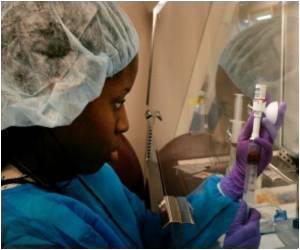Researchers have now discovered that a conservative approach to removing the lymph nodes has lesser harm for cancer patients and has the same benefits as radical procedure

Dr. Roshni Rao, associate professor of surgery at UT Southwestern, and other investigators from the Harold C. Simmons Cancer Center reviewed studies on patient outcomes of women who had received various forms of surgical treatment, ranging from removal of one lymph node to prevent the spread of breast cancer to removing the entire network of lymph nodes spanning the armpits.
Until recently, clinical practice guidelines advised complete axillary node dissection - removal of all 20-30 axillary nodes - if a woman's sentinel node biopsy was positive. The sentinel node is generally the first node to which cancer cells will spread from a primary tumor. A positive sentinel lymph node biopsy indicates the tumor has metastasized and can be used to determine the stage of the cancer. Axillary lymph nodes are distributed at the edge of the chest muscles and into the armpits and lower neck.
For women with no suspicious axillary nodes who undergo breast-conserving therapy, there is little evidence of benefit in doing a complete axillary node dissection compared with sentinel node biopsy alone, the reviewers reported. Breast conserving therapy is defined as partial mastectomy followed by whole breast radiation.
"In the past, axillary nodal status was a critical factor considered in therapy decisions," said Dr. Rao, a breast cancer surgeon. "With the validation of sentinel lymph node biopsy, the same staging information can be obtained with less morbidity and risk to the patient. And now that decisions regarding chemotherapy are often guided by molecular tumor profiling in an era of personalized medicine, there are other avenues to explore beyond aggressive surgeries."
To assess the effect of the guidelines, Dr. Rao and her colleagues reviewed the risks and benefits of sentinel node biopsy as compared with complete axillary node dissection in previous published research. They also compared these procedures with nonsurgical interventions (i.e., additional radiation) in women with breast cancer who do not have palpable lymph nodes or ultrasound evidence that their cancer has spread to the axillary nodes.
They also reviewed the rate of recurrence of axillary node metastases, mortality, morbidity, and complications associated with each intervention, using online medical databases. In all, more than 1,000 results were examined from 17 studies to write the JAMA review.
Other authors include Dr. David Euhus, professor of surgery, a Simmons Cancer Center member and part of the Division of Surgical Oncology; Dr. Charles Balch, professor of surgery, oncology and dermatology and Deputy Director of the Johns Hopkins Institute for Clinical and Translational Research; and Helen Mayo, Faculty Associate in the UT Southwestern Library.
About UT Southwestern Medical Center
UT Southwestern, one of the premier academic medical centers in the nation, integrates pioneering biomedical research with exceptional clinical care and education. The institution's faculty includes many distinguished members, including five who have been awarded Nobel Prizes since 1985. Numbering more than 2,700, the faculty is responsible for groundbreaking medical advances and is committed to translating science-driven research quickly to new clinical treatments. UT Southwestern physicians provide medical care in 40 specialties to nearly 90,000 hospitalized patients and oversee more than 1.9 million outpatient visits a year.
Source-Newswise
 MEDINDIA
MEDINDIA



 Email
Email










